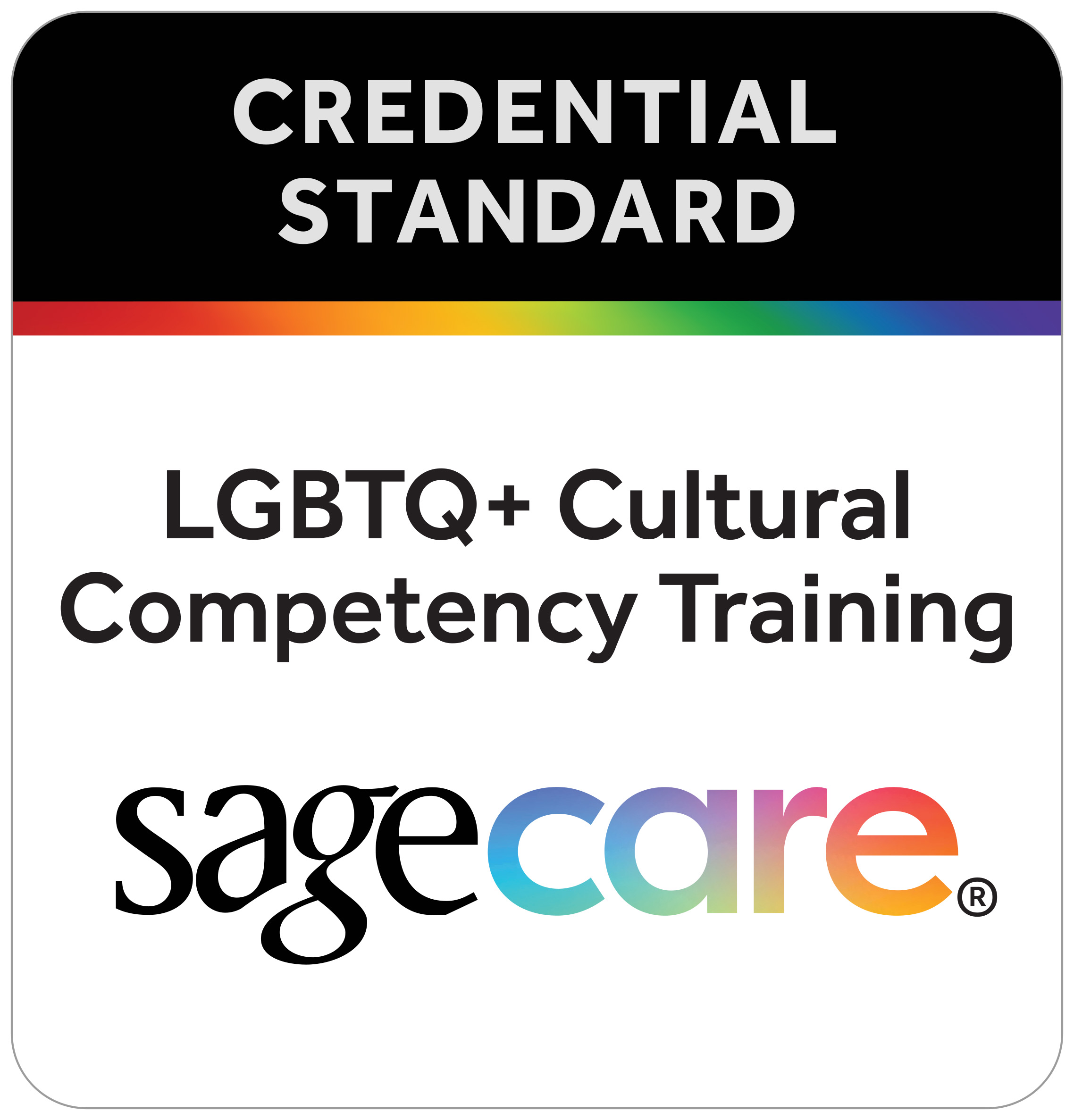
Standard
50% of management and 50% non-management staff combined complete a one-hour SAGECare training.



Creating Inclusive Communities is a one-hour introductory training specifically designed for staff working in nursing care and other residential care settings. Participants study the unique needs of LGBTQ+ older adults through an overview of the various rights and protections extended to LGBTQ+ residents. They’re also equipped with best practices for building communities that remain welcoming to LGBTQ+ older adults, their caregivers, and their loved ones.
Supporting LGBTQ+ Older Adults is a one-hour introductory training that reviews terminology useful for the inclusive care of LGBTQ+ older adults, such as lesbian, gay, bisexual, and transgender. Participants contextualize this information and learn more about the lives of LGBTQ+ older adults through case studies and recorded videos of real people, explore access to local and national resources, and obtain best practices they can integrate into their everyday work.
This training introduces the specific needs and experiences of LGBTQ+ older adults receiving homecare. Participants will learn the definition of terms such as Lesbian, Gay, Bisexual, Transgender, and others. After this introduction to useful terminology, participants will contextualize the lives of LGBTQ+ older adults through case studies and videos of real individuals, to understand why some LGBTQ+ older adults may choose not to come out and may have difficulty inviting care providers into their home. Participants will receive best practices on how to provide services in an inclusive way.
Four-Hour In-Person Training is an interactive program for management team members that paints a nuanced picture of the needs, concerns, and culture of LGBTQ+ older adults and provides actionable resources for organizational improvement. Leadership leave with an understanding of why LGBTQ+ older adults are less likely to access sufficient health and social services and obtain best practices and procedures for helping them feel more included in an organization’s community.
Virtual Training is a dynamic program for management team members that consists of one self-paced 75-minute online course this course is to be completed in 30 days and prior to the 90-minute live webinar with SAGECare experts.
This 60-minute live-webinar session serves as a check-in with leadership/management who have completed the management course. The SAGECare Certified Trainer will guide the conversation as a consultant and share any updates and data to ensure that leadership/management have the most up-to-date information. Participants will engage with best practices that they explored in the management training, and discuss what has been done, and what still needs to be accomplished. This is a useful check-in for organizations that would like to update their information and continue their progress towards inclusion.
Interested in SAGECare training but unsure about implementation? For large organizations with internal training teams, the new T-Cert program is designed to help. This trainer certification program provides access to our online management course, which can be hosted on your internal system. A SAGECare Certified Trainer will work with your designated internal trainers to ensure they can effectively deliver SAGECare training, including initial sessions, observations, and follow-ups. Reach out to SAGECare today to see if the T-Cert program is a good fit for your organization.
This training is an update based on new information released in a 2023 report, which reflects the best research and practical approaches available in the field today. During this training, participants will explore how current intake processes frequently fail to consider LGBTQ+ individuals and discover new ways of asking intake questions that are LGBTQ+ inclusive. Participants will walk away with best practices on asking questions, becoming comfortable with a range of responses, and implementing inclusive intake processes at their organization.
During this training, participants will focus on three key areas. First, providers can use the information to ensure their services are welcoming to LGBTQ+ people with dementia. Second, how to support caregivers who identify as LGBTQ+ – these may be partners of people with dementia or the adult children or friends of people with dementia. Finally – we will look at some ways that providers can help advocate for LGBTQ+ people with dementia, including working in your local communities to help reach LGBTQ+ people and make sure you can connect them to affirming services.
This training focuses on understanding and examining the common assumptions about LGBTQ+ older adults of color and learning why they may have different needs and relationships with their identity than other LGBTQ+ older adults. Participants will explore the unique experiences of LGBTQ+ older adults of color and leave with best practices for working with them.
This training discusses common myths and stigmas associated with HIV and individuals living with HIV. Participants will explore the history of HIV within the LGBTQ+ community and issues that LGBTQ+ older adults may still be dealing with today as a result of living through the height of the HIV/AIDS epidemic in America. Participants will leave with best practices for culturally sensitive care.
This training offers valuable information applicable in both professional and personal settings. After this training, participants will be able to explain the terms lesbian, gay, bisexual, and transgender, as well as other terms that can be used with this community. Participants explore the needs of LGBTQ+ older adults and their care networks and gain a better understanding of the unique issues experienced by LGBTQ+ caregivers.
This training discusses the power dynamics that lead to bullying and how to differentiate between bullying and other types of behavior. Participants will explore ways to engage stakeholders as bystanders to prevent bullying behavior, learn how bullying specifically affects LGBTQ+ older adults, and identify ways to implement procedures that reduce and manage bullying.
This training reviews suggestions for preventing bias and creating inclusive services for LGBTQ+ older adults. It discusses conflict resolution and concrete programming ideas and policies that ensure staff and constituents feel respected and safe. Participants will walk away with an understanding of how an inclusive environment can improve the health and happiness of both staff and constituents.
This training provides a deeper dive into the lives and experiences of transgender older adults. Participants will be guided through the many choices that a transgender individual can make to live and express their gender identity, as well as best practices for understanding and validating those choices. This includes subjects such as relationships, names and pronouns, and different definitions of what it means to transition. Participants will walk away with a better understanding of how to support transgender older adult clients in their community.
This training focuses on the unique financial needs and experiences of LGBTQ+ older adults. During the training, participants will learn key terminology related to LGBTQ+ communities and identify which terms are respectful. The course provides an overview of the needs, concerns, experiences, and considerations of LGBTQ+ elders as they navigate their finances and prepare for aging with dignity. Participants will also explore concrete steps to build relationships with LGBTQ+ clients. (This training is 75 minutes long, with additional cost.)
All residents are welcome to this engaging conversation around diversity and inclusion. This conversation will serve as a safe space to ask questions, learn information, and engage constructively and openly around LGBTQ+ communities. Every one of us either identifies as LGBTQ+ or has a family member, friend, colleague, or future friend that identifies as LGBTQ+ – learn how to use correct language, create a welcoming environment, and ask the right questions.
The End-of-Life training takes participants through the unique and often overlooked needs and experiences of LGBTQ+ older adults as they plan for the latter half of their lives to ensure their desires are honored and their needs are met. Ensuring the proper paperwork is in place is critical to aging with dignity and respect. It is vital to a community that often relies on relationships that are not legally recognized and usually estranged from their next of kin. The training helps care providers understand the paperwork necessary and the intricacies of LGBTQ+ relationships through three stages of life – planning for the end of life, coping with a significant illness, and end-of-life/funeral services. The training promises to be an essential addition to SAGECare’s training library as we aim to better every aspect of aging for our LGBTQ+ older adults.
This presentation provides a deep dive into the lives and experiences of transgender individuals. Participants will be guided through the many choices that a transgender individual can make to live and express their gender identity and best practices for understanding and validating those choices. This includes subjects such as relationships, names and pronouns, and different definitions of what it means to transition. This training also consists of understanding the needs of subpopulations within the transgender community and their experiences in care. Participants will walk away with a better understanding of ways in which to support transgender clients in their community.
SAGE is committed to making our materials accessible to all individuals and maintaining open dialogue through the accommodation process. Reasonable accommodations for accessibility can be made upon request, please email ([email protected]) with your request. We request at least two weeks’ notice to assure that the accommodation meets your needs.